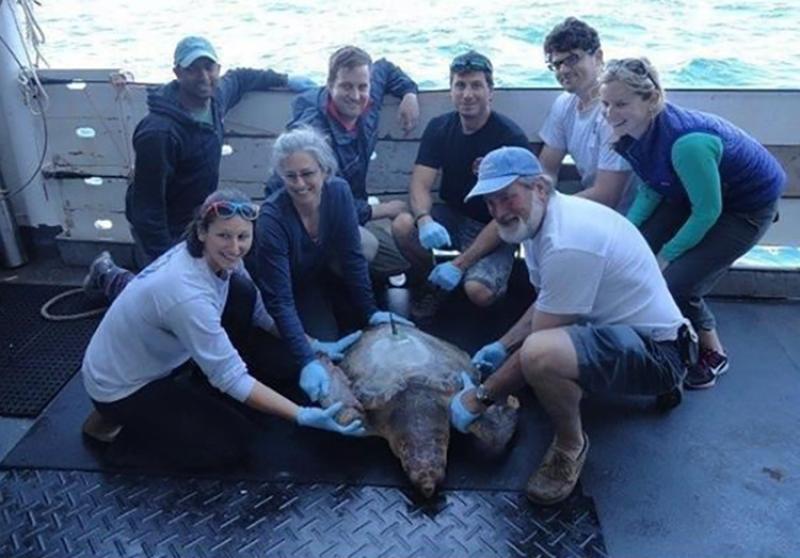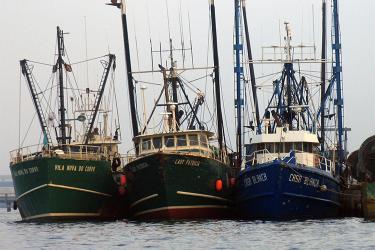We continue our series to introduce the people who work at the Northeast Fisheries Science Center. Each month we feature a new "face" from the Center's five laboratories and share with you a bit about who they are, what they do at the Center, and what they enjoy doing in their spare time.
Where Did You Grow Up?
I grew up in the town of Duxbury on the south shore of Massachusetts, south and east of Boston along the coast and just north of Plymouth. My parent’s house overlooked a large saltwater marsh, and I spent my youth playing and exploring in that marsh and at the beach. When I was ten, I purchased a small pram with a 4-hp engine that allowed me to explore even more of the marsh. When I turned 14, I was allowed to use our 13-foot Boston Whaler and Duxbury Bay, Plymouth Bay and the surrounding area became my playground. I fished, had lobster traps, waterskied, and had a blast with my friends.
Where Did You Go to School and What Did You Get Your Degree (s) In?
I received my undergraduate degree from Connecticut College. I had no idea what I wanted to become, so I tried different subjects but always gravitated back to the sciences. I learned that I liked studying animal behavior and was able to combine physiological psychology and zoology and attain my bachelor’s degree.
After graduation, still uncertain what I wanted to do in life, I applied and was accepted to the marine fisheries program of the U.S. Peace Corps. After culture, language, and technical training, I set out to help educate fishermen in the Philippines that dynamite fishing was destroying the habitat and poor for the long-term sustainability of their fish populations. When that was not working, I helped them build artificial reefs to provide structure that had once been there. I also worked with a non-profit in the U.S. to start a swine (pig) dispersal program, as I was convinced that their near-shore fisheries were doomed as dynamite fishing had already taken a heavy toll on their coral reefs.
After the Peace Corps and a stint as a fisheries observer in Alaska, a friend at the University of Rhode Island informed me of a position with Dr. Joe DeAlteris at the URI Fisheries Program. I worked for the program for almost six years, spending time on all types of fishing vessels studying gear designs to reduce bycatch, and was able to attain (mostly) my Master of Science (MSc.) in Fisheries. During this time I also worked with the Center's Ecosystems Surveys Branch and the Massachusetts Division of Marine Fisheries (MADMF), where I worked for three years. Arne Carr of MADMF hired me, and while there I also worked with the fishing industry to develop and test modifications to fishing gear to reduce bycatch.
Tell Us a Little About How You Came to Work at the Science Center.

While with MADMF I was asked to assist the Ecosystems Surveys Branch from time to time. Tom Azarovitz, chief of the branch at the time, convinced me that I should come work for him. I did and enjoyed working with that group. They helped me take the time to finish my MSc degree, and I worked on several challenges at the time. After a few years with the Ecosystems Surveys Branch, I saw a position open in the Protected Species Branch for someone to work on bycatch, which is the unwanted fish or other animals that are caught during commercial fishing operations targeting another species. Since this is what I had spent most of my career doing, I jumped on the announcement and landed a position again dealing with animal behavior and bycatch reduction. I will say, I did not realize at the time how much more difficult it is working with marine mammals and turtles compared to finfish and other more abundant species.
What Do You Do at the Center?

Capturing turtle for tagging and sampling before release. Credit: NOAA Fisheries.
What Do You Like Most About Your Job?
The people and the quality of the work being performed at the Center is amazing. There is so much talent here, and I love the fact that my job affords me the ability to assist and learn from others. During my career here I have spent time tagging turtles, chasing sedated seals, photographing right whales and a host of other neat projects.
My real job is working with others to help understand and mitigate bycatch. I have worked a lot with fishermen, a group that I came to respect early in my career. They helped me understand and collectively solve several bycatch issues. As I am getting older, I really enjoy working with others to continue finding gear solutions to reduce bycatch. I was fortunate to hire Eric Matzen, who is able to work with and communicate effectively with the fishing industry. Together, and with the help of industry and others, I hope we can find solutions to help fishermen continue to fish while working on ways to reduce the impact of fishing gear on protected species and other marine species.
What Are Some of Your Hobbies?

I have a wonderful wife, Cheryl, who is a high school science teacher, and two great sons, Ian and Trevor. Ian will be attending the University of Massachusetts Amherst in the fall to study physics, and Trevor will be a junior at Roger Williams University where he is studying marine biology. He would like to attend graduate school and then work on fish ecology or ocean ecology.
For the last decade, my hobby was mostly transporting the kids to athletic games and watching them play. During the summers, we fish (not good at catching), tube and water ski, and play on the water. My youngest son just graduated high school, so we will be ‘empty nesters’ this fall. I will have more time and may need to find more hobbies, though I never seem to have extra time. I like to have some type of project underway, whether it is building something or planning something. I also enjoy cooking and yard work, except weeding. Most days you can find me walking with my dog (we recently lost one, also a yellow lab), so another hobby is getting outside and walking with Molly.



